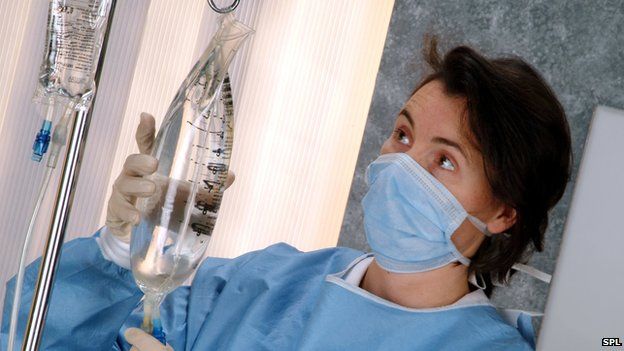One fifth of patients' drips 'are dangerous'
- Published

A fifth of patients on an intravenous drip develop complications because they are given the wrong levels of fluid, according to a review of guidance in England and Wales.
Too much fluid can cause heart failure and too little leads to kidney problems.
The National Institute for Health and Care Excellence (NICE) said doctors and nurses needed better drip training.
Patients' groups said the scale of the problem was "staggering".
Thousands of people each year need a drip in hospital. But NICE warns that staff are putting lives in danger due to a lack of education in managing intravenous drips.
It has developed new guidelines for the NHS in England and Wales.
Dr Mike Stroud, a gastroenterology consultant at Southampton University Hospitals NHS Trust, who developed the guidelines, said: "Doctors and other health professionals are not well educated in terms of what a patient needs and that is astonishing really.
"This needs to change."
Drip chief
Hospitals will also be expected to appoint an "intravenous fluid champion" and patients' drips will need to be managed and monitored more closely.
Katie Scales, a consultant nurse at Imperial College Healthcare NHS Trust, said: "The majority of patients who receive intravenous fluids do so without complications but this is not the case for every patient.
"This NICE guideline is an important lever for improvement and may ultimately help to save lives."
Katherine Murphy, the chief executive of the Patients' Association, said the guidelines were "very welcome" due to the "staggering" figure of one in five patients developing complications.
"It's essential that all staff receive support and training in the administration of IV fluids and hospitals should ensure time is dedicated to this," she added.
Dr Mike Durkin, director of patient safety at NHS England, said: "I welcome this new guidance.
"Hospitals across the country need to ensure that the recommendations are implemented as routine practice so that the clinical effectiveness of infusion fluids are maximised and any risks are minimised."
- Published21 May 2013
- Published25 October 2012
- Published12 July 2012